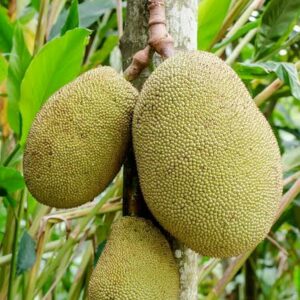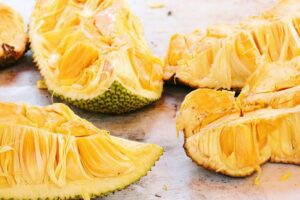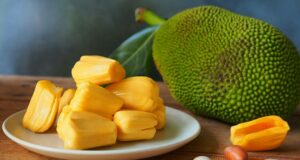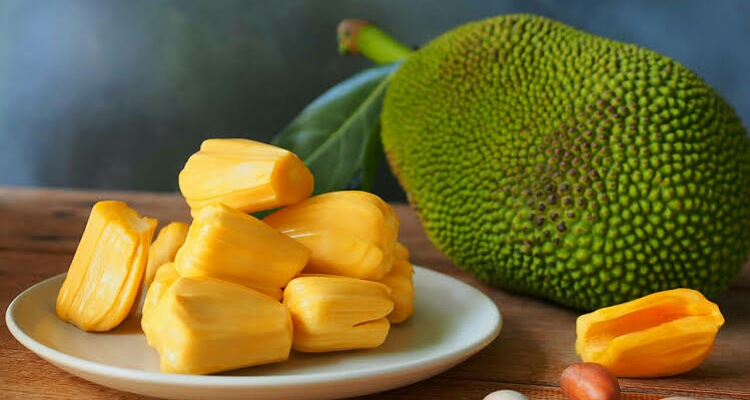Jackfruit is one of the largest fruits in the world. It is grown in several countries and is famous for its multiple health benefits and delicious taste.
Jackfruit
Jackfruit is a tropical delicious and nutritious fruit that is common in Asia, Africa, Australia, South East Asia, and Brazil. It grows on a tree and the fruit has a hard exterior that is green or yellow and has spikes.
When the fruit is cut open, inside you will find multiple seeds each surrounded by a yellowish firmish pulp. There is some stickiness in this pulp. Both the pulp and the seeds are edible.
Raw fruit can be made into a vegetable as well and the ripened fruit can be eaten as such. It has a sweet taste and is slimy.

Nutritive value of the fruit
The fruit has high nutritive content and calories. One cup of sliced fruit provides 157 calories. The carbs in this are 38 grams, fats are 2 grams, and proteins are 3 grams.
It also has calcium in the amount of 40 mg in one cup. It has other vital minerals and vitamins C and B group.
The vitamins are more in quantity compared to bananas, avocados, apples, and apricots. It has folate, niacin, riboflavin, potassium, and manganese in good amounts.
Jackfruit is a colored fruit and hence it is rich in vitamin A and carotenoids. These are good for eyesight and the prevention of cellular damage.
Therefore, these phytochemicals prevent eye damage due to cataracts and macular degeneration. They also contribute to the prevention of cancer and heart diseases.
The carotenoid levels are more in ripe fruit compared to raw ones.

The fruit also has high levels of other antioxidants. These aid in delaying the aging process and protects skin cells from UV damage.
The seeds have higher levels of these antioxidants compared to the pulp. Therefore, the seeds of this fruit too have high nutritional value and can be roasted and consumed.
Health benefits
Jackfruits are loaded with fiber. These help in satiety and bowel movements. Thus eating this fruit pulp is good to overcome constipation and regularize bowel habits.
The fruit pulp also aids in gastric and duodenal ulcer healing and prevention. The absorption of the pulp is slower with jackfruit. Hence there is no rapid rise in blood sugar.
This aspect of the fruit would be useful for diabetic patients. They can control their blood sugar better with it.
The fruit pulp is also useful in the control of high blood pressure. There is a good amount of potassium in this fruit and this can control high blood pressure and prevent stroke, heart attack, and bone loss.
It keeps skin smooth and firm. The nutrients in this fruit can fight cancer cells and could serve as a good supplement with chemotherapy.

Allergies to this fruit are extremely rare. But in people with birch pollen allergy, jackfruit consumption could develop into a hypersensitivity reaction. The allergy can present with swollen lips and an itchy throat.
Also, read Diet drinks: are they healthy?
The raw fruit can be cut and cooked until tender. It tastes like meat. The ripe fruit can similarly be cooked before consuming them.
The seeds can be roasted or cooked before eating them. Canned jackfruits are also available in supermarkets for customer convenience.
